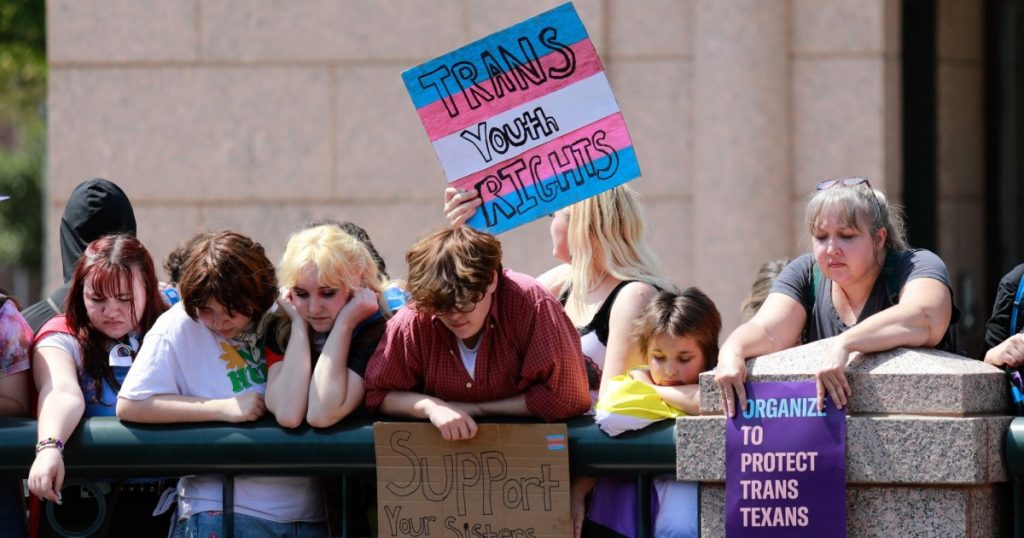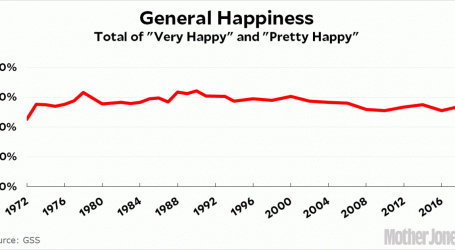The Confusing State of Legal Challenges to Bans on Transgender Healthcare
Reginald Mathalone/NurPhoto
Fight disinformation: Sign up for the free Mother Jones Daily newsletter and follow the news that matters.The state of the legal challenges to laws banning gender-affirming care is, and will continue to be, confusing. The latest example is particularly striking. Last Friday, there were two major rulings. In Texas, a judge blocked a ban on gender-affirming healthcare, then her decision was paused by the state’s attorney general’s office. In Missouri, a judge ruled that a ban on care could go into effect.
These concurrent decisions add to the mounting anxiety for transgender youth and their loved ones across the country as legal battles are fought. While some hope that courts can halt these bans, it has been unclear what will happen next—and state-by-state decisions could vary. The ban on care in Missouri goes into effect today. Texas will soon follow.
“The courts told the transgender community, parents of gender-expansive youth, and the entire LGBTQ+ community that we do not exist, that we do not have the right to make our own medical decisions or the right to bodily autonomy,” Aro Royston, the board secretary for Missouri LGBTQ advocacy group PROMO, said in a statement following the ruling.
More than a third of transgender youth ages 13 to 17 live in states that have passed bans on gender-affirming care. The first three months of 2023 saw more bills introduced that attacked access than the last six years combined. Judges in some states, like Florida, Georgia, and Indiana, have blocked aspects of these laws or halted the whole measure. Several other states have laws that are not yet in effect or have “grandfather” clauses that could wear off soon.
Last week’s rulings show how confusing things will be as laws are litigated. In Texas, following district court Judge Maria Cantú Hexsel’s decision to halt the ban, the state attorney general’s office filed an appeal with the Texas Supreme Court, a move that automatically pauses the injunction. This means the Texas ban will go into effect in a few days. It will ban care for transgender youth, revoke the licenses of physicians who continue providing care, and cut off access to care for adolescent minors already receiving treatment. According to Judge Hexsel, the law “interferes with Texas families’ private decisions and strips Texas parents…of the right to seek, direct, and provide medical care for their children.”
Each ruling, each day, and each month comes with new uncertainties for families who are considering how to care for their children. Those already receiving care—including some adults who are impacted by these laws—are thrust into limbo, and forced to decide whether to wait it out or try to leave. And if they can find a way to leave, how do they know which states will remain as havens for care? The absence of this life-affirming healthcare can be devastating for transgender youth. According to The Trevor Project, more than 1.8 million LGBTQ youth, ages 13 to 24 in the US, seriously consider suicide each year, and at least one attempts suicide every 45 seconds.
Every major medical organization across the country, including the American Medical Association, opposes bans on gender-affirming care for minors and approves the care when given appropriately.
Missouri’s new law prohibits healthcare professionals from providing gender-affirming surgeries to children, makes it so Medicaid will no longer cover treatments for adults, and blocks the state’s ability to give these surgeries to prisoners. Medical professionals who continue this care risk losing their licenses. The move also grants a longer period where former patients can sue their old providers and ensures at least $500,000 in damages if they succeed.




